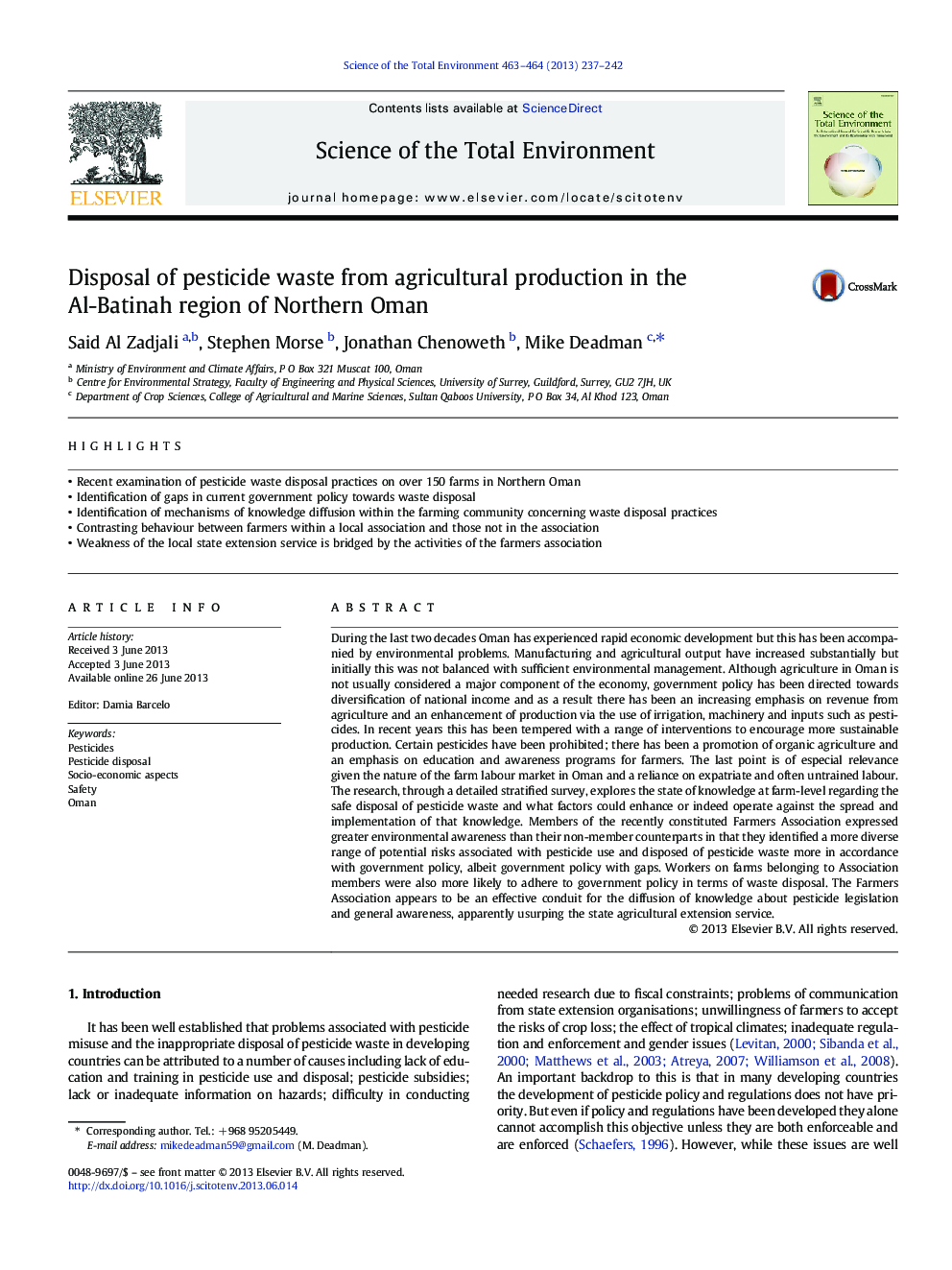| کد مقاله | کد نشریه | سال انتشار | مقاله انگلیسی | نسخه تمام متن |
|---|---|---|---|---|
| 6332734 | 1619798 | 2013 | 6 صفحه PDF | دانلود رایگان |
عنوان انگلیسی مقاله ISI
Disposal of pesticide waste from agricultural production in the Al-Batinah region of Northern Oman
ترجمه فارسی عنوان
دفع زباله های سمی از تولیدات کشاورزی در منطقه البیتنا عمان شمالی
دانلود مقاله + سفارش ترجمه
دانلود مقاله ISI انگلیسی
رایگان برای ایرانیان
کلمات کلیدی
آفت کش ها، دفع آفت کش، جنبه های اجتماعی و اقتصادی، ایمنی، عمان،
ترجمه چکیده
در دو دهه گذشته عمان توسعه سریع اقتصادی را تجربه کرده است، اما این موضوع با مشکلات محیطی همراه است. تولید و خروجی کشاورزی به طور قابل ملاحظه ای افزایش یافته است، اما در ابتدا این با مدیریت زیست محیطی کافی نبود. اگر چه کشاورزی در عمان معمولا جزء اصلی اقتصاد نیست، سیاست دولتی به سوی تنوع درآمد ملی هدایت شده است و به همین دلیل تاکید بیشتر بر درآمد حاصل از کشاورزی و افزایش تولید از طریق استفاده از آبیاری، ماشین آلات و ورودی ها مانند آفت کش ها. در سال های اخیر این امر با تعدادی از مداخلات برای تشویق تولید پایدار تر صورت گرفته است. برخی از آفت کش ها ممنوع است در حال توسعه کشاورزی ارگانیک و تأکید بر برنامه های آموزشی و آگاهی برای کشاورزان بوده است. آخرین نکته، با توجه به ماهیت بازار کار مزرعه در عمان و وابستگی به نیروی غیرمتمرکز و غالبا آموزش ناپذیر، اهمیت ویژه ای دارد. این تحقیق، با استفاده از یک نظرسنجی دقیق طبقه بندی شده، وضعیت دانش در سطح مزرعه را در رابطه با دفع زباله های سموم دفع آفات بررسی می کند و چه عوامل می تواند در برابر گسترش و اجرای این دانش افزایش یا در واقع عمل کند. اعضای اتحادیه کشاورزان اخیرا متشکل از آگاهی های محیط زیستی نسبت به همتایان غیر عضو خود را نشان دادند که طیف وسیعی از خطرات احتمالی مرتبط با استفاده از آفت کش ها را شناسایی کرده و بیشتر از مواد زائد آفت کش ها مطابق با سیاست های دولت منع شده اند، با این وجود سیاست های دولت با شکاف ها. کارگران مزارع متعلق به اعضای انجمن نیز احتمال بیشتری دارند که از سیاست های دولت در زمینه دفع زباله پیروی کنند. انجمن کشاورزان به نظر می رسد کانال موثر برای انتشار دانش در مورد قوانین آفت کش ها و آگاهی عمومی است، ظاهرا غرامت در خدمات خدمات پس از کشاورزی دولت.
موضوعات مرتبط
علوم زیستی و بیوفناوری
علوم محیط زیست
شیمی زیست محیطی
چکیده انگلیسی
During the last two decades Oman has experienced rapid economic development but this has been accompanied by environmental problems. Manufacturing and agricultural output have increased substantially but initially this was not balanced with sufficient environmental management. Although agriculture in Oman is not usually considered a major component of the economy, government policy has been directed towards diversification of national income and as a result there has been an increasing emphasis on revenue from agriculture and an enhancement of production via the use of irrigation, machinery and inputs such as pesticides. In recent years this has been tempered with a range of interventions to encourage more sustainable production. Certain pesticides have been prohibited; there has been a promotion of organic agriculture and an emphasis on education and awareness programs for farmers. The last point is of especial relevance given the nature of the farm labour market in Oman and a reliance on expatriate and often untrained labour. The research, through a detailed stratified survey, explores the state of knowledge at farm-level regarding the safe disposal of pesticide waste and what factors could enhance or indeed operate against the spread and implementation of that knowledge. Members of the recently constituted Farmers Association expressed greater environmental awareness than their non-member counterparts in that they identified a more diverse range of potential risks associated with pesticide use and disposed of pesticide waste more in accordance with government policy, albeit government policy with gaps. Workers on farms belonging to Association members were also more likely to adhere to government policy in terms of waste disposal. The Farmers Association appears to be an effective conduit for the diffusion of knowledge about pesticide legislation and general awareness, apparently usurping the state agricultural extension service.
ناشر
Database: Elsevier - ScienceDirect (ساینس دایرکت)
Journal: Science of The Total Environment - Volumes 463â464, 1 October 2013, Pages 237-242
Journal: Science of The Total Environment - Volumes 463â464, 1 October 2013, Pages 237-242
نویسندگان
Said Al Zadjali, Stephen Morse, Jonathan Chenoweth, Mike Deadman,
